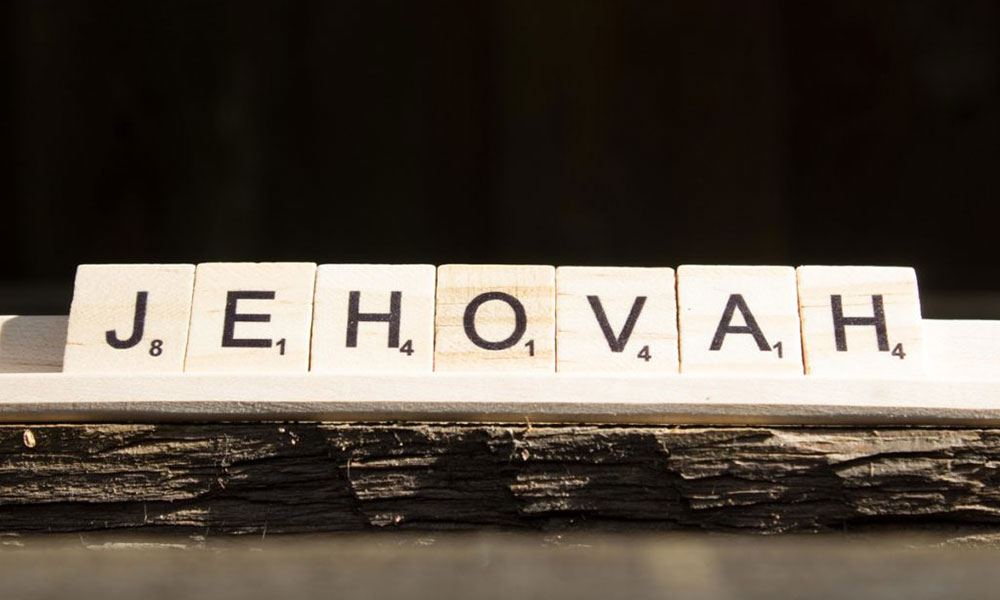(The Names of God - Part 1 | Part 2 | Part 3)
As we study the Bible, we become aware of the importance of names and their meaning in the ancient East. In that culture, the giving of a name had particular significance and people were frequently named or renamed for a characteristic or capacity the name wanted them to have. Thus, Abram (high father) became "the father of many nations" and Jacob (the supplanter) became "You have striven with God and with men and have prevailed," to give two examples.
Nowhere is this more true than in the case of God Himself. God wants His people to know Him intimately. One way He does this is through revealing His many names, each with a particular meaning. Throughout the ages we see Him giving His people a fuller and fuller revelation of Himself, finally culminating in the perfect revelation, Jesus Christ.
Eliohim - "God Almighty" or the "Creator God"
The Scripture: Genesis 1:1
"In the beginning God created the heavens and the earth."
1. What was God's first act?
Elohim, the name by which God calls Himself in this first verse of Genesis can be translated simply as "God Almighty" or the "Creator God," who possesses all the divine powers.
From the beginning of time, God presents Himself as a powerful, creative God, the One who created the heavens and the earth and everything within them. But this was not the only way He wanted His people to know Him.
Jehovah – The Covenant Name of God
The Scripture: Genesis 2:7
"The Lord God formed the man from the dust of the ground and breathed into his nostrils the breath of life, and the man became a living being."
2. How did God create man?
3. What did He do next?
God was not content that His people know Him only as a creator. A powerful god can be a frightening god, as well, not necessarily a god we love. To show us a loving god, the writer of Genesis uses a different name in this verse: Yahweh or Jehovah. Jehovah shows God as a Person who is in relationship with His human creations. Here He is seen as a faithful god, One who keeps His promises and wants a people who can reciprocate His love.
This is the name by which Abraham, Isaac, and Jacob knew, loved, and reverenced Him. It is the name God has given us as well, so we might know we can love Him personally.
Do you remember the promise God made to Abram (Abraham) when He told him to leave his family and nation?
The Scripture: Genesis 12:2-3
"I will make you into a great nation and I will bless you; I will make your name great, and you will be a blessing. I will bless those who bless you, and whoever curses you I will curse and all peoples on earth will be blessed through you."
4. What are the essential elements of God's promise to Abram?
When God made this promise to Abram, Abram was seventy-five years old, and Sarai was well past child-bearing age. How was God going to fulfill such a promise?
The Scripture: Genesis 17:15-16
"As for Sarai your wife,...I will bless her and will surely give you a son by her."
5. What additional element did God make to His promise?
The Scripture: Genesis 17:17
"Abraham fell face down;...and said to him (God), 'Will a son be born to a man a hundred years old? Will Sarah bear a child at the age of ninety?'"
6. How old were Abraham and Sarah at this time?
God gave Abraham the mind-staggering promise that Sarah would bear a son in her old age. A short time later three men (angels) appeared to Abraham. As they were leaving, one of them identified Himself as the Lord and amplified the promise God had given Abram earlier.
The Scripture: Genesis 18:10
"I will surely return to you about this time next year, and Sarah your wife will have a son."
7. What was His promise?
El Shaddai - "the God who is enough" or "the God who is sufficient"
Both Abraham and Sarah laughed when they heard this promise. Because it would take an incredible God to fulfill this promise, God revealed Himself under a new name, El Shaddai. El Shaddai means "the God who is enough" or "the God who is sufficient."
We all have lacks in our lives - so God showed another aspect of His character - He is a God of miracles. When we worship the Lord God, El Shaddai, we never need give up or despair. Our God of miracles is a God who is sufficient for all our needs.
God proved Himself to be a God of miracles by giving Abraham and Sarah a son, whom they named Isaac, "Laughter."
Jehovah Jireh –The Lord is Our Provider
As we look at this continuing revelation of God in the Bible, the next name we learn to know Him by is Jehovah Jireh.
The Scripture: Genesis 22:1-2
"Some time later God tested Abraham. He said to him, 'Abraham!' 'Here I am,' he replied. Then God said, 'Take your son, your only son, Isaac, whom you love and go to the region of Moriah. Sacrifice him there as a burnt offering on one of the mountains I will tell you about.' "
8. What did God tell Abraham to do?
Can we imagine the pain Abraham experienced when he heard God's words? God had performed a miracle in giving him his son, Isaac. Now He was asking Abraham to sacrifice him.
The Bible is often sparse in its details. It relates nothing of what Abraham experienced, telling us only that God spoke and Abraham obeyed. We receive a small bit of revelation in the book of Hebrews.
The Scripture: Hebrews 11:17-19
"By faith Abraham, when God tested him, offered Isaac as a sacrifice. He who had received the promises was about to sacrifice his one and only son, even though God has said to him, 'It is through Isaac that our offspring will be reckoned.' Abraham reasoned that God could raise the dead, and figuratively speaking, he did receive Isaac back from death."
9. How did Abraham reason, according to the author of Hebrews?
But there is a whole world of difference between the words “could” and “would”. Most Christians believe that God can raise the dead, but when it comes down to specific cases, will He actually do it? Nevertheless, Abraham was obedient and took Isaac to Mt. Moriah, along with the materials needed for a burnt offering. When they arrived, Isaac asked a very important question.
The Scripture: Genesis 22:7-9
"Isaac said, ‘Where is the lamb for the burnt offering?' Abraham answered, 'God himself will provide the lamb for the burnt offering, my son.' "
10. What was Isaac's question?
11. What was Abraham's answer?
In faith, Abraham answered:
Abraham made all the preparations for the sacrifice, building an altar and binding Isaac and placing him on the altar.
The Scripture: Genesis 22:10-12
"Then he reached out his hand and took the knife to slay his son. But the angel of the Lord called out to him from heaven... 'Do not do anything to him. Now I know that you fear God, because you have not withheld from me your only son.' "
12. What happened just as Abraham was about to sacrifice Isaac?
The Scripture: Genesis 22:13
"Abraham looked up and there in a thicket he saw a ram caught by its horns. He went over and took the ram and sacrificed it as a burnt offering instead of his son. So Abraham called that place The Lord Will Provide."
13. What did Abraham see?
14. What did Abraham call this place?
Jehovah Jirah, the Lord will provide. This is a name by which every Christian knows their Lord.
The Scripture: Philippians 4:19 (The Amplified Bible)
"My God will liberally supply (fill to the full) your every need according to His riches in glory in Christ Jesus."
15. What is Paul's promise in this verse?
We want to spend a minute looking at the one need every man, woman, and child possesses - that is the need to have our sins forgiven if we are to obtain eternal life. We can provide for many of our needs ourselves. We have ways of acquiring food, housing, good health. But there is no way to escape the fact that we are sinners, and we need someone sinless to pay the price for those sins. Only God could do this.
In the story of Abraham's willingness to sacrifice his son, we have a foreshadowing of Jesus' death.
The Scripture: John 3:16
"For God so loved the world that He gave His one and only Son, that whoever believes in Him shall not perish but have eternal life."
16. How did God do this?
Isaiah gives us a graphic picture of this sacrifice.
The Scripture: Isaiah 53:5
"He was pierced for our transgressions, He was crushed for our iniquities; the punishment that brought us peace was upon Him, and by His wounds we are healed. We all, like sheep, have gone astray, each of us has turned to His own way; and the Lord has laid on Him the iniquity of us all."
17. Why did Christ die for us?
18. How did Christ's punishment bring us peace?
The Scripture: Romans 5:8
"God demonstrates his own love for us in this; While we were still sinners, Christ died for us."
19. What was our condition when Christ died for us?
In the following lessons, we will learn how the names of God progressively reveal Him to us.
(The Names of God - Part 1 | Part 2 | Part 3)
The Answers
- He created heaven and earth.
- From the dust of the ground
- He breathed the breath of life into his nostrils.
- That He would make him into a great nation and a blessing to all people of the earth. He would bless those who blessed him and curse those who cursed him.
- That Sarai would be the mother of a son
- Abraham was 100; Sarah 90
- That Sarah would bear a son within a year
- To take Issac to Moriah and sacrifice him there as a burnt offering
- That God could raise the dead
- "Where is the lamb for the burnt offering?"
- “God Himself will provide the lamb."
- An angel called out to him not to do anything.
- A ram caught in a thicket by its horns
- Jehovah Jireh. The Lord Will Provide.
- That the Lord will provide everything we need
- By giving His Son
- Because we have all gone astray (sinned).
- God laid our iniquity on Him.
- We were sinners.
All scripture quotations in this publication are from the Holy Bible, New International Version
(unless otherwise indicated)
Copyright © 1973, 1978, 1984, New International Bible Society
Copyright © 2001 by JoAnne Sekowsky





